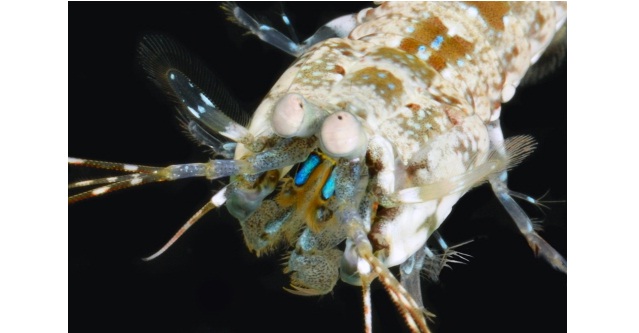A new method of developing polarizers, devices which rotate the plane of light, has been developed which mimics the way shrimps polarize light. Whilst humans use polarizers in sunglasses and DVD players shrimp have been using them to communicate without having to worry about any prey eavesdropping on their conversation.
 Image credit Roy Caldwell, University of California, Berkeley
Image credit Roy Caldwell, University of California, Berkeley
The researchers, from the Univeristy of Bristol, found that mantis shrimps use a unique polarizing structure, which has never been seen before, to communicate. Mantis shrimps have been known to have 'secret' conversations using polarized light as a medium. Over their lifetime mantis shrimp develop bright reflectors that regulate and maintain the polarization of visual light signals.
Polarization is an intrinsic property of light which is rarely used as a method of animal communication. It's rarity means that the conversation cannot be 'heard' by any eavesdroppers; as a result, animals using light polarization to communicate can prevent unwanted competition and are also less likely to be seen by predatory animals.
The team used a combination of theoretical modeling, light measurements and anatomical experiments to study the photonic mechanism of these creatures. They observed that their polarizers manipulate light across the polarizing structure instead of manipulating it through its depth. This mechanism reveals information on the working principles behind standard polarizers. It provides animals with very thin yet dynamic optical structures that are capable of creating bright and large colorful polarized signals.
When it comes to developing a new way to make polarizers, nature has come up with optical solutions we haven't yet thought of. “Industries working on optical technologies will be interested in this new solution mantis shrimp have found to create a polarizer as new ways for humans to use and control light are developed.
Dr Nicholas Roberts - School of Biological Sciences, University of Bristol
The research has been reported in the journal Scientific Reports